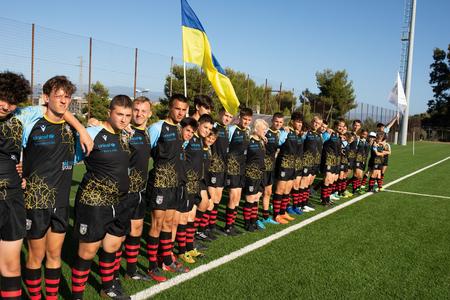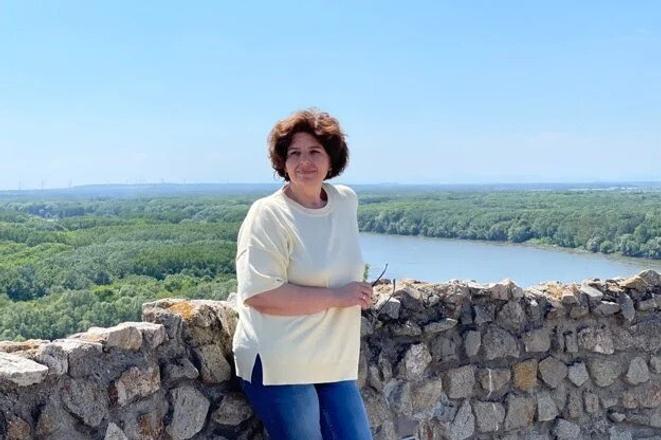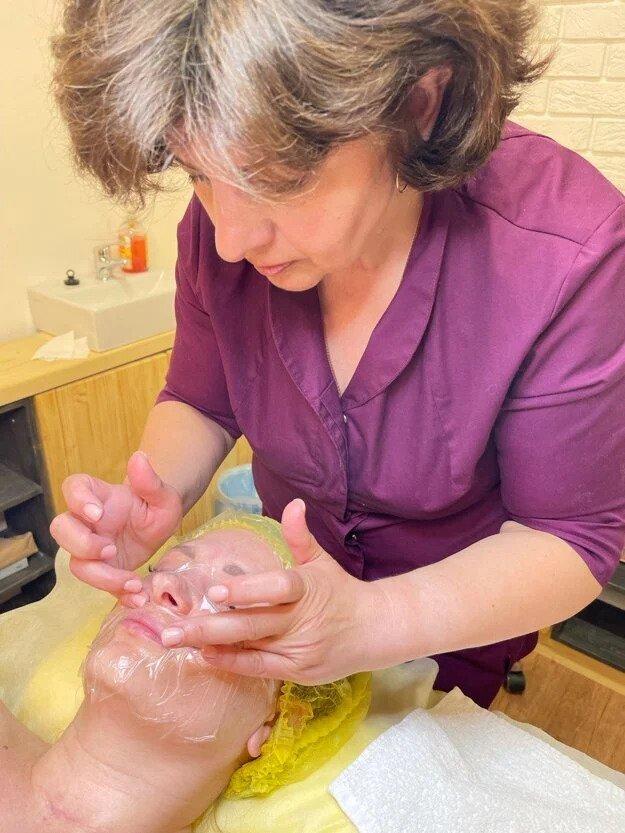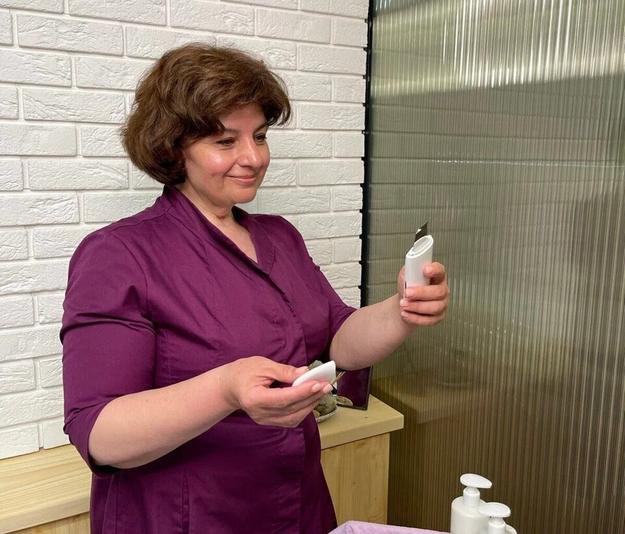Ukrainian version | Slovak version
As the weather outside gets colder, it is getting busier in Hanna Semenova’s salon in Bratislava. People are hoping that the Ukrainian aesthetician will help them prepare their skin for the winter.
If she isn’t in her salon, which she runs with other Ukrainian women, applying skin care products to a client’s face, Semenova may be offering consultations to Ukrainian women or writing skin care protocols for Slovak clients. The skin care specialist even squeezed in a few tips on how to make your skin look better during an interview with The Slovak Spectator, recommending professional cosmetic products selected by a specialist, leading a healthy lifestyle and self-massaging your face.
“At least one and a half minutes during face washing in the morning and in the evening,” the opponent of facial injections says about the length of a self-massage. “Ideally, you should do a 20-minute massage during the day with special facial products.”
She believes that a person can look good regardless of age or health problems. Semenova knows it well.
Cancer made her aesthetician
Ten years ago, she was diagnosed with cancer.
“After a while I realised that I don’t look very good. I really wanted to have good skin,” she says.
But doctors, unlike aestheticians, did not allow her to undergo any cosmetic treatments. She wasn’t the only woman dealing with the same problem and striving to look great at the same time. So she herself decided to become an aesthetician.
She says that she chose aesthetic cosmetology because it doesn’t require medical education, and doesn’t involve any serious interventions such as facial injections. The treatments she offers to clients, like facial cleaning, do not have an immediate effect, but week after week she claims that the condition of a client’s skin improves.
“Maybe a person does not feel that ‘wow effect’ the first time, but over time you see how your face and skin have changed,” the Ukrainian says.
To be sure that she uses top products, the Ukrainian adds that she always tests all the cosmetics she uses at work on herself at first.
When someone makes an appointment to consult their skin care with her, Semenova always asks for their facial photo and about cosmetic products they use as well as potential health problems to be of help to the client. For example, cosmetics containing seaweed cannot be used by people with thyroid problems, the Ukrainian explains. Then, in addition to a consultation, cleaning the client’s face can begin.

‘Queen of disinfection’
Starting a business in Slovakia was not a walk in the park.
Semenova found herself in Slovakia three days after Russia invaded Ukraine on February 24, 2022. “My house is 30 km away from the Russian border. I saw how the invasion began,” the Ukrainian recalls. “A real war started.” The Kharkiv native packed her stuff in 15 minutes and left the city with her family and grandchildren, except her husband, in a car.
Slovakia wasn’t a big unknown to Semenova. She had visited Bratislava before the war to see her niece. However, her situation was different and confusing.
“At first it was a shock, we did not know where to start and what to do next,” she recalls, “It was difficult to accept the situation.”
But after Ukrainian refugees were granted temporary refuge in Slovakia, things were gradually starting to settle down for Semenova. Soon she found a job at Medirex laboratories, where she cleaned and disinfected five floors of offices and laboratories until January of this year.
“It was not an easy job,” she notes. “But if you see the positives in every job, it brings satisfaction.”
She was then telling herself that she was the ‘queen of disinfection’.
Apart from work, Semenova also took up free Slovak lessons in the hope of going back to her profession as aesthetician in Slovakia later on. Her colleagues at Medirex also used to read children’s books with her to help her overcome the language barrier.
“Slovaks are very open people and are always ready to give help and support,” the building designer-turned-aesthetician says.
After passing the necessary exams in Slovakia, Semenova received certificates that would help her open a salon in the Slovak capital.
In her opinion, Slovak women are very cautious when it comes to cosmetic products. They sometimes don’t understand what some treatments are for, the aesthetician says.
“Ukrainian women are more interested in cosmetics and learning about it,” Semenova thinks.
In their salon, Ukrainian women from Odessa, Kyiv and Kharkiv and she work together. They all met at cosmetology courses in Bratislava. In Ukraine, each had their own salon.
In love with Slovak cuisine
If she doesn’t work, Semenova usually spends her free time with family and grandchildren. The aesthetician also continues to work on her Slovak skills.
Moreover, she and her sister are Nordic walking enthusiasts.
Semenova hopes that other Ukrainians will learn from Slovaks and share their experience with Slovaks in return. Despite the invasion, she says, Ukrainians shouldn’t waste their time, embracing the opportunities offered to them and the culture that they have found themselves in.
“If we respect the residents of other countries, we will be treated the same way,” Semenova says.
Unlike Slovak health care, which the cancer survivor finds overcomplicated, the Ukrainian woman fell in love with Slovak cuisine. She adores local ‘knedlíky’ (dumplings) and ‘chlebová polievka’ (bread soup). She says that in Slovakia, traditions and family always come first. Ukrainians, unfortunately, often forget about these things, Semenova thinks.
“At Christmas, for example, Slovak families usually gather together. I would like to take this tradition with me to Ukraine - as well as the understanding that people need to rest and take time for themselves.”
This story was published with support from the International Press Institute's Ukraine regional reporting fund.


 Aesthetician Hanna Semanova at Devín Castle. (source: Archive of H. S.)
Aesthetician Hanna Semanova at Devín Castle. (source: Archive of H. S.)
 Hanna Semanova at work. (source: Archive of H. S.)
Hanna Semanova at work. (source: Archive of H. S.)
 Hanna Semenova in her Bratislava salon. (source: Archive of H. S.)
Hanna Semenova in her Bratislava salon. (source: Archive of H. S.)